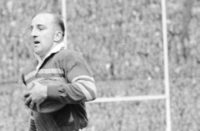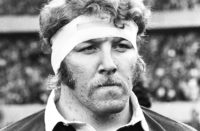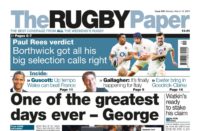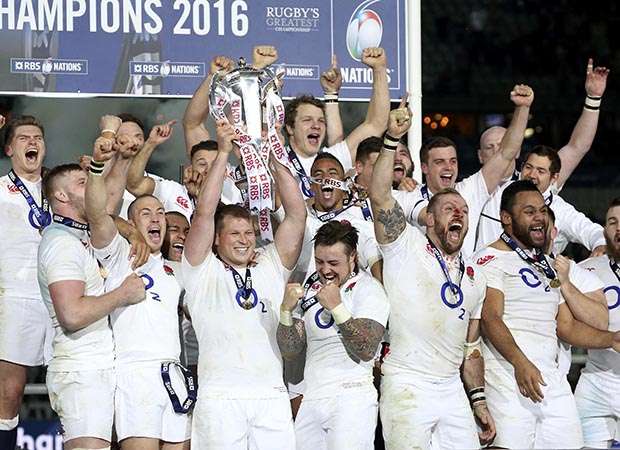 And so ‘Fast Eddie' has lived up to his name. A Six Nations Grand Slam at the first attempt made all the more significant given England's track record for losing them on an extravagant scale.
And so ‘Fast Eddie' has lived up to his name. A Six Nations Grand Slam at the first attempt made all the more significant given England's track record for losing them on an extravagant scale.
So many had dissolved in so many places – Wembley 1999, Murrayfield 2000, Lansdowne Road 2001, Dublin again in 2011 and Cardiff three years ago. To add insult to injury, they managed along the way to alienate the Irish, cause Royal offence and inflict recurring despair on the Red Rose legions.
Five times out of six, the country with more players and more money than any other had the ultimate prize in their sights. Five times out of six they collapsed in a heap within sight the finishing post, finishing in the same spread-eagled state as Devon Loch in the 1956 Grand National.
At times when Scott Spedding shredded their defence only to out-speed his support runners, there was fleeting danger of England tripping up where they hadn't tripped up before in a Grand Slam denouement.
This was the first one they claimed in the French capital since winning there 93 years ago in the days before Wavell Wakefield wound up in the House of Lords.
Who knows, if Eddie Jones carries on sweeping all before him, he, too, may end up ennobled by the British Establishment.
Seasoned observers of English Grand Slam deciders learned a long time ago not merely to fear the worst but to adopt a fatalistic approach, that if anything can go wrong, it will.
The presumption had stood them in such good stead that on the one occasion when their team got it all right on the field, in Dublin 13 years ago, they still managed to offend just about the whole Republic of Ireland.
Martin Johnson, told by officials that his team had lined up on the wrong side of the red carpet for the pre-match formalities, refused to budge, thereby provoking a diplomatic incident before, during and after the presentation of his team to the then President of Ireland, Mary McAleese.
The Irish would get their own back when England returned to Dublin eight years later with the same prize as stake. This time a team managed by Johnson avoided upsetting the Irish before the match before proceeding to upset them on it to such an extent that they got stuffed.
If England felt they had nothing to apologise to Ireland for in 2003, they could have made one to their own supporters for going to all that trouble only to see their team a very distant second.
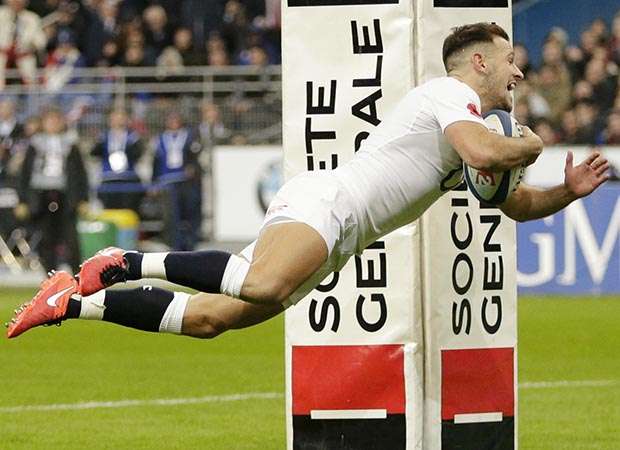 By then the RFU had endured another Slam faux pas of such cringing embarrassment that it left them no option but to express their sorrow publicly. As groveling apologies go, the one president Jeff Addison made at Murrayfield at the end of the 2000 tournament tops the list.
By then the RFU had endured another Slam faux pas of such cringing embarrassment that it left them no option but to express their sorrow publicly. As groveling apologies go, the one president Jeff Addison made at Murrayfield at the end of the 2000 tournament tops the list.
On that occasion, England's players managed to snub the one member of the Royal Family who cares about rugby more than any other. In their crushing disappointment at succumbing to an unfancied Scotland, the vanquished then failed to turn up to collect the trophy.
The numbing weather made their no-show all the more inexcusable. Princess Anne, turning a collar up against the Siberian weather in typically stoic response to her predicament, waited and waited for skipper Matt Dawson or anyone in a Red Rose to condescend to collect the silver trophy perched in front of her.
The RFU, dropped from a great height into a mess of their team's making, blamed “a breakdown in communication” in apologising to Her Royal Highness, the sponsors and the England supporters. Dawson's feeble claim that he didn't know there was a trophy to collect sounds all the more so now than it did then.
At the end of the following season, Dawson did remember to collect the trophy and never can a Championship-winning team have looked as miserable as England did. And that was before they knew they had contributed to their own downfall with some careless talk.
The match, postponed from the previous spring because of the foot-and-mouth epidemic, took place after the English-dominated Lions had lost an enthralling series in Australia whose support team included one Edward Jones.
Keith Wood, a central figure who claimed the Wallabies won because they'd cracked the Lions' lineout code, could hardly believe what he was hearing that day in Dublin.
“There was something about their lineout calls that was familiar to me,'' Wood recalled. “I recognised them during the game but couldn't figure out from where. Then Malcolm O'Kelly (Ireland's lock forward) came over and said, ‘Woody, they're using the Lions calls from the summer'.''
And so they were. And who should score the try that cost England the Slam that year? Why, Keith Wood, albeit indirectly from his own throw.
At least that time England only upset themselves and nobody more than plain Clive Woodward.
At Wembley in 1999, when Scott Gibbs changed the course of
history and the habit of a lifetime by weaving past opponents instead of running over them, Woodward wound up fielding a complaint from the Welsh race relations council.
After much huffing and puffing, it came to nothing, rather like France in Paris last night.


